#peter the lett
Text



Roger Delgado as a hotel waiter (but could he be something more sinister...?), Pepito, in Maigret: Peter the Lett (4.12, BBC, 1963)
#fave spotting#roger delgado#bbc maigret#maigret#peter the lett#1963#classic tv#pietr le letton#pietr the latvian#the penultimate episode proper of bbc Maigret#and while i really want to avoid spoilers for the sake of some mutuals i will say#this is an unusually bleak and downbeat episode that should have come with a warning for fans..#pietr le letton was the first Maigret novel published‚ so it feels sort of appropriate to be heading to the end of the series with it#the final episode itself is i suspect another xmas episode (at least‚ it went out on xmas eve 63) (i haven't watched it yet)#and there was a one off special that followed some time later#but yeah this was... oof
23 notes
·
View notes
Photo








Franz Kafka's It's a Wonderful Life (1993) | dir. Peter Capaldi
#franz kafka’s it’s a wonderful life#filmedit#filmgifs#richard e. grant#peter capaldi#julie cox#crispin letts#franz kafka#short film#*
115 notes
·
View notes
Text

"When I was a child, being a huge Doctor Who fan, I wrote numerous letters to the Doctor Who office largely inquiring about how the show was made.
"When it arrived the surprise package also [in addition to two full Jon Pertwee scripts] contained set designs and studio floor plans for these episodes and a delightful letter from producer Barry Letts giving me an idea what all this stuff was.
"It was a fantastic insight into both Doctor Who and TV production generally. I had never seen a script in any form whatsoever before then and was immediately fascinated by the documents."
The actor, who won a short film Oscar in 1993, was inspired to pursue a career on stage and screen by the BBC package.
He said: “That was a trigger to my ambition to work somehow – I didn’t know how - in TV. The scripts are still sitting on my bookshelf.”
-Peter Capaldi, quoted in an old Scottish Express article, written back in 2008 when he was announced to play Caecilius (est in horto) in Fires of Pompeii
#peter capaldi#barry letts#doctor who#john pertwee#i'm so grateful for the luxury of so many scripts being online#to learn from#and see what does & doesn't work well#all the scaffolding#so glad they're bringing back a version of DWConfidential#to inspire kids about how shows are made#rather than those fake fluffy internet-challenge fellow-kids cringe vids#also here have some baby!PCap#lookit these cuties
31 notes
·
View notes
Photo
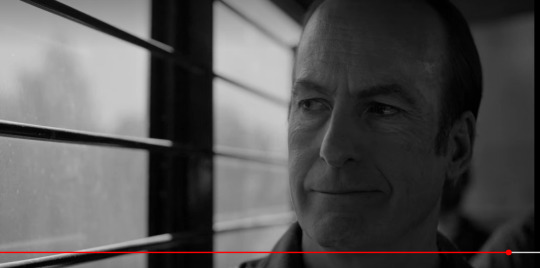
Better call Saul
#better call saul#bob odenkirk#heroes#vince gilligan#serie#peter gould#jonathan banks#giancarlo esposito#rhea seehorn#killer joe#tracy letts#william friedkin#cult#film#cinema#movies#great directors#matthew mcconaughey#emile hirsch#juno temple#gina gershon#thomas haden
4 notes
·
View notes
Text
I Miei Libri del 2023
Leggere libri è il gioco più bello che l’umanità abbia inventato.
Wisława Szymborska
1 - Benjamin Stevenson - Tutti nella mia famiglia hanno ucciso qualcuno
2 - Bernardo Zannoni - I miei stupidi intenti
3 - Michela Marzano - L'amore che mi resta
4 - Martin Griffin - L'impostore
5 - Eric Fouassier - L'ufficio degli affari occulti
6 - Wendy Doniger - L'anello della verità
7 - Peter Hopkirk - Il Grande Circo
8 - Carmine Pinto - Il Brigante e il Generale
9 - Susan Cain - Il dono della malinconia
10 - Dennis Duncan - Indice, Storia dell'
11 - Maria Grazia Calandrone - Dove non mi hai portata
12 - Eshkol Nevo - Tre Piani
13 - Marcus Du Sautoy - L'enigma dei numeri primi
14 - Pietro Trifone - Brutte, sporche e cattive
15 - Giuseppe Barbera - Agrumi. Una Storia del Mondo
16 - Gianrico Carofiglio - Della gentilezza e del coraggio
17 - Audrey Magee - La colonia
18 - Edith Wharton - L'età dell'innocenza
19 - Antti Tuomainen - Il fattore coniglio
20 - Geoff Dyer - Natura morta con custodia di sax
21 - Franco Lorenzoni - Educare controvento
22 - Toshikazu Kawaguchi - Finché il caffè è caldo
23 - Florian Illies - 1913
24 - Francesco Paolo De Ceglia - Vampyr
25 - Richard Osman - Il Club dei delitti del giovedì
26 - Giulio Boccaletti - Acqua
27 - Domenico Dara - Malinverno
28 - Alessandra Necci - Al cuore dell'Impero
29 - Andrew Verghese - Il patto dell'acqua
30 - J.F. Powers - Morte d'Urban
31 - Imma Eramo - Il Mondo Antico in 20 Stratagemmi
32 - Gianni Solla - Il ladro di quaderni
33 - Alice Cappagli - Niente caffè per Spinoza
34 - A.K. Blakemore - Le streghe di Manningtree
35 - A.J. West - La meccanica degli spiriti
36 - Eric Fouassier - Il fantasma del Vicario
37 - Beatrice Salvioni - La Malnata
Nel 2023, finalmente, ho superato le 10 mila pagine lette, arrivando a quota 11336. Era un piccolo limite personale, niente di competitivo, ma il fatto di aver cambiato metodo di lettura mi ha aiutato nell'intento. Quest'anno ho letto anche libri su consigli di amici di Tumblr, uno tra questi è stato un regalo graditissimo. Per quelle vie misteriose e magiche che i libri ti fanno seguire, a volte ho comprato, senza saperlo, libri che sono complementari per tematiche e trame. Obiettivo del prossimo anno è leggere un classico a trimestre. Se ci sono curiosità sui titoli, chiedete!
50 notes
·
View notes
Text
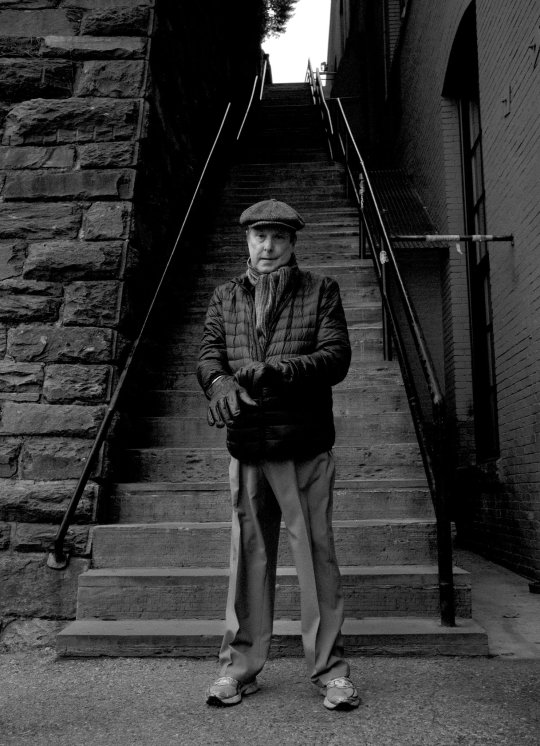
The film director William Friedkin, who has died aged 87, was slightly older than the “movie brats” group (Steven Spielberg, Martin Scorsese and so on) credited with revolutionising US cinema in the late 1960s and early 70s.
Like Robert Altman and Sidney Lumet, Friedkin had come to cinema through TV and documentary, but made a vital contribution to the American new wave. His double-whammy in the first half of the 1970s, The French Connection (1971) and The Exorcist (1973), met with critical acclaim and a level of box-office success that elevated them into pop-culture phenomena. They also managed to overshadow everything else he did.
Nevertheless it would be wrong to characterise his career as a rise and fall. His finest hour was arguably the 1985 cop-and-counterfeiters thriller To Live and Die in LA, while he scored a modest triumph late in the day with his 2011 adaptation of Tracy Letts’s southern-fried noir play Killer Joe. But his steady hand, his timing and his commercial savvy were evident in those early hits. The French Connection, with its preference for hand-held, vérité-style camerawork and on-the-hoof sound recording, sometimes at the expense of intelligibility, took the American policier to a level of authenticity and grittiness to which the genre still aspires today.
Friedkin was never shy of owning up to his mistakes; his 2013 memoir, The Friedkin Connection, opens with an account of various regrettable errors, including passing up the chance to buy an ownership stake in Mike Tyson and throwing away some sketches by the then-unknown artist Jean-Michel Basquiat. To these can be added his reluctance to cast Gene Hackman as The French Connection’s dishevelled antihero, “Popeye” Doyle.
Actor and director fought regularly. “His outbursts [onscreen] were aimed directly at me … more than the drug smugglers.” Among the film’s five Academy Awards was a best actor prize for Hackman’s snarling performance, and one for Friedkin as best director.
The Exorcist followed Roman Polanski’s Rosemary’s Baby (1968) in bestowing upon the modern horror movie a new sheen of class and respectability. Friedkin integrated serious themes with extreme gore and intense terror, but rejected the idea that The Exorcist belonged to the horror genre. “I think it deals with issues far more profound than what you find in the average horror film. To be frank with you, Bill [the writer William Peter Blatty] and I never set out to make a horror film. The idea never crossed our minds. To me, The Exorcist was a story about the mystery of faith, and I tried to depict that as realistically as possible.”
His parents and grandparents had fled Kiev (Kyiv) in the early 1900s, making the passage to the US by hiding on freighter ships. William was born and raised in Chicago, the son of Rachel (nee Green), who gave up her job as an operating-room nurse when he was born, and Louis, a former semi-professional softball player turned cigar maker and men’s clothing salesman. Friedkin characterised his own adolescence as one of frustration and thwarted dreams: “From an early age, my ambitions overwhelmed my abilities,” he wrote. “It’s a miracle I didn’t end up in jail or on the streets.”
He graduated from Senn high school in 1953 and got a job in the post-room of a local Chicago television station, WGN-TV. He worked his way up through various positions, acting as floor manager on several hundred shows before a vacancy opened for a director of live drama.
But it was a cinematic experience around the same time that proved formative. One afternoon in the early 60s, Friedkin went to see Orson Welles’s Citizen Kane for the first time, entering the cinema at noon and not leaving until late that evening, having watched the movie five times back-to-back: “No film I’ve seen before or since meant so much to me. I thought, ‘Whatever that is, that’s what I want to do…’ On that Saturday, just three years younger than Welles when he created Kane, I resolved to become a film-maker.”
In 1962, he made The People vs Paul Crump, an award-winning documentary about a man on death row, and also directed an episode of The Alfred Hitchcock Hour, before knocking out four features: Good Times (1965), a vehicle for the musical duo Sonny & Cher; the comedy The Night They Raided Minsky’s and an intermittently electrifying screen version of Harold Pinter’s The Birthday Party (both 1968); and another theatre adaptation, The Boys in the Band (1970), about a group of gay friends.
In his 1998 book Easy Riders, Raging Bulls, the film historian Peter Biskind wrote that on the basis of those last two films, Friedkin had acquired a “reputation for being an art film director, the kiss of death. He was depressed, afraid he would never work again.”
Salvation came in the shape of a screenplay adapted from a factual bestseller about the NYPD’s campaign to smash a drug ring. Friedkin brought an unprecedented level of realism to The French Connection. A key sequence, thrillingly executed by Friedkin, features a seven-minute chase through Brooklyn, with Popeye (in a stolen car) trying to outrun and intercept his quarry, who has hijacked the train speeding along the elevated track above him.
Friedkin was not bashful about his Oscar win: Biskind reported that the director had his chair on the set of The Exorcist emblazoned with the words “An Oscar for The French Connection”. His behaviour had also become harsher and unrulier, even if there was usually a method to his madness (such as slapping a real priest, who had been hired to play an absolution scene, in order to produce the required nervous energy).
The Exorcist was a calculating combination of the portentous and the shrill, mixing highfalutin religious inquiry with brazenly shocking scenes showing Regan (played by the 13-year-old Linda Blair) masturbating with a crucifix, growling obscenities and projectile vomiting. Friedkin’s grasp of tone was sure, though the movie sometimes seemed to be in denial about its own carnivalesque tactics.
These two defining peaks of Friedkin’s career were followed in 1977 by his most conspicuous commercial flop: Sorcerer, a thriller about four men driving a combustible cargo of dynamite through the rainforest. It was based on the same source material as Henri-Georges Clouzot’s masterpiece The Wages of Fear, and while not in the same league it was nonetheless undeserving of its box-office fate.
Various factors were blamed, ranging from Friedkin’s hubris to a release date adjacent to Star Wars. It would not be until a remastered print of Sorcerer was screened at the Venice film festival in 2013 that it would begin to lose its unwarranted taint of failure. He insisted it was the work of his which remained closest to his original vision: “The way I saw the film in my mind’s eye, that is the one that’s pretty much there.”
His usual bluster was absent from his next film, the low-key comedy-thriller The Brink’s Job (1978), a dramatisation of the $3m Brink’s robbery in Boston, which Friedkin made when his proposed film of Born on the Fourth of July (later shot by Oliver Stone) fell through.
The mixture of sensational subject matter and po-faced tone that had served him so well on The Exorcist did not prove so successful with Cruising (1980), a lurid and occasionally objectionable thriller starring Al Pacino as a cop who goes undercover in the gay S&M subculture to catch a murderer.
An early draft of the script had been leaked, prompting an onslaught of objections from the gay press, and by the time the film emerged heavily trimmed by the censor’s scissors, it was something of a tarnished cause célèbre. Though Cruising is more complex and conflicted than some of its detractors would allow, it looks unlikely to undergo the same critical rehabilitation as Sorcerer.
To Live and Die in LA showed that not only had Friedkin’s French Connection-era knack for dynamic action sequences not deserted him, but he could combine it with a slicker, stylised aesthetic. The rest of the 80s, however, was not a fertile time for him. He made Deal of the Century (1983), a listless comedy about the arms race, the TV movie C.A.T. Squad (1986) and the thriller Rampage (1987), which he adapted himself from William P Wood’s book.
The Guardian (1990) returned him to the horror genre. Blue Chips (1994), a drama about the politics of college basketball, was subtle and powerful, with an uncompromising lead performance by Nick Nolte, but it foundered commercially (it went straight to video in the UK). The thriller Jade (1995) earned some notoriety when its extravagantly paid screenwriter Joe Eszterhas complained of the changes made to his script; Friedkin, who was responsible for the rewrites, later named it as his favourite of his own movies.
Rules of Engagement (2000) was a mediocre drama with reactionary overtones, about a court-martial following the massacre of civilians in Yemen. The star of that film, Tommy Lee Jones, was reunited with the director in another thriller, The Hunted (2003). But Friedkin found new momentum of sorts in two adaptations of claustrophobic thrillers by Letts – Bug (2006) and Killer Joe.
In 2013, he returned to Pinter’s The Birthday Party, directing the play for the stage in Los Angeles, with Tim Roth and Steven Berkoff among the cast. However, this was postponed at the 11th hour when Friedkin decided to replace Berkoff in the part of the intimidating inquisitor Goldberg (though Berkoff claimed to have resigned). The production did not find a replacement and was never staged.
In 2018, he was the subject of Friedkin Uncut, which combed through his career and featured interviews with collaborators, celebrity fans and the director himself, who is heard confirming that he only ever asks for one or two takes: “I’m not looking for perfection,” he says.
His final films were The Devil and Father Amorth (2017), a documentary about a real-life exorcist, and The Caine Mutiny Court-Martial (2023), an updated adaptation of the Herman Wouk novel first filmed in 1954, starring Kiefer Sutherland. It will premiere next month at the Venice film festival, where the director was honoured in 2013 with a lifetime achievement award.
Friedkin’s reputation as bullish extended to all areas of his life and work. As an interviewee he was comically blunt. Responding to an Independent journalist who complained that the prologue to The Exorcist was baffling, he said: “I don’t have to explain it. You’re free to think of it, or to dismiss it, in any way that you want. It’s called mystery … Jackie Collins writes crisp narrative. I suggest you read all of her books. You will never be in doubt about where the story is going.”
And he rebuffed a Guardian reporter’s suggestion that he subscribed to the auteur theory, which prizes the director as the ultimate author of a film: “Didn’t you hear what I said? Am I talking to deaf ears? No! No! ... The auteur theory is a load of bollocks!”
His first three marriages ended in divorce: that to the actor Jeanne Moreau lasted from 1977 to 1979; that to another actor, Lesley-Anne Down, from 1982 to 1985; and that to the journalist Kelly Lange from 1987 to 1990. The following year he married the former chief executive of Paramount, Sherry Lansing.
She survives him, along with a son, Cedric, from a relationship with Jennifer Nairn-Smith, and a son, Jack (Jackson), from his second marriage.
🔔 William Friedkin, film director, producer and screenwriter, born 29 August 1935; died 7 August 2023
Daily inspiration. Discover more photos at Just for Books…?
21 notes
·
View notes
Text
Maigret in Gloves

There are a few Rupert Davies Maigret episodes where we encounter Maigret in leather gloves. This episode, "Peter the Lett" (Pierre le Letton) (1963) involves one of Maigret's saddest cases. Here, we see Maigret with Hector Torrence, one of his faithful assistants, waiting for swindler, Peter the Lett, at the Gare du Nord.
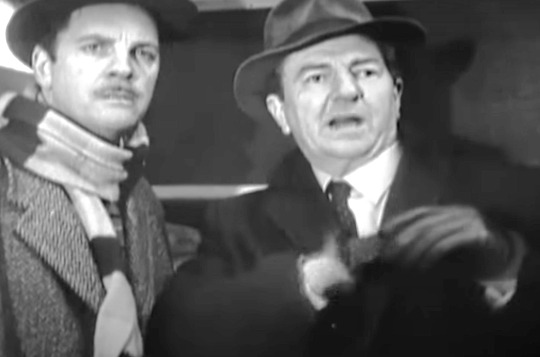
Torrence, played by Victor Lucas (not to be confused with Sergeant Lucas (Inspecteur Lucas) played by the excellent Ewan Solon), is fatally shot at a hotel.

Nice view of his gloves here - I wish we saw them in more episodes.

Towards the end of the episode, Maigret and Lucas discover the body of a man passing off as Peter the Lett dead on a beach. We only see one glove as Maigret has been shot at the hotel, putting the other arm out of action.
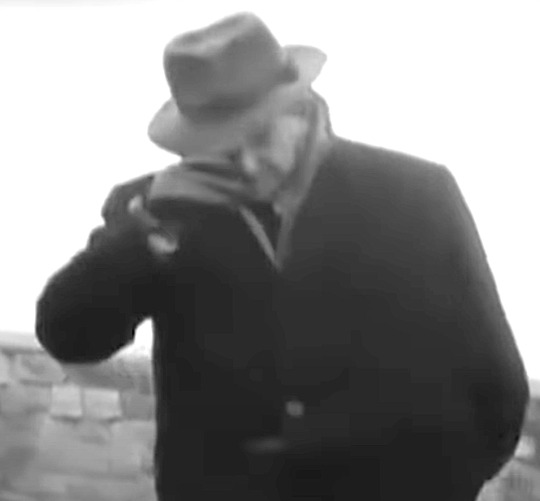
A pity we don't see him in gloves and smoking his pipe (we do in another episode, which I will try and locate stills of).
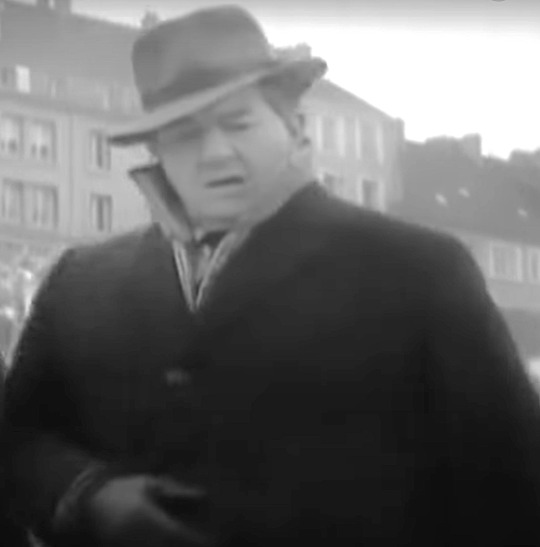
Even so (and even with poor quality images), the sight of Rupert Davies in leather gloves is particularly alluring.
Fun fact: in a later book, Simenon invents a conversation with his own creation. The premise is that the novels are all journalistic reportage, with Simenon (referred to as "Sim") shadowing Maigret through each investigation. Simenon admits that, in Pierre le Letton, he lied: it was not Torrence who died but another officer. Maigret tells Sim that Torrence was annoyed at being killed off in the book and Maigret still sees him regularly when he comes by to show off his new sports car and with a new girl in his arm, .
6 notes
·
View notes
Photo
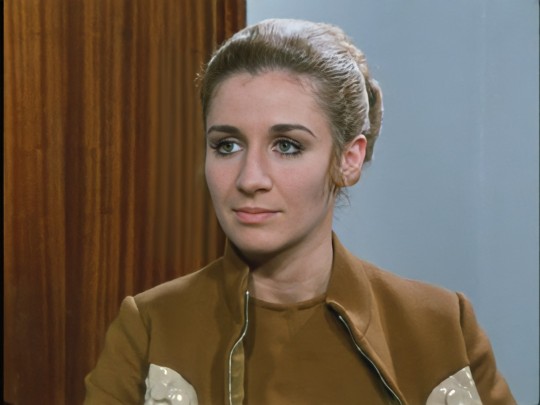


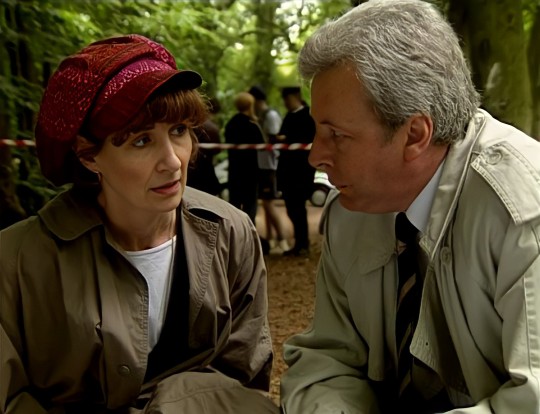
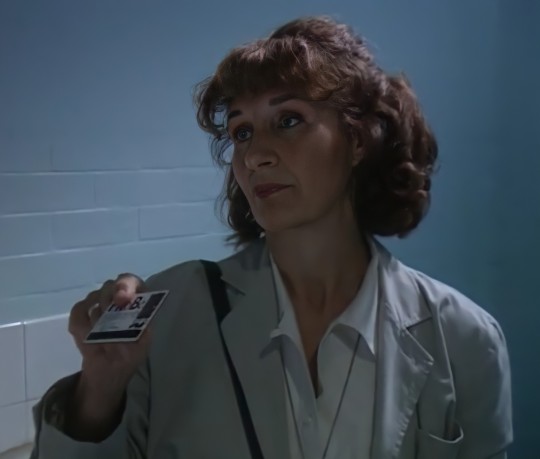
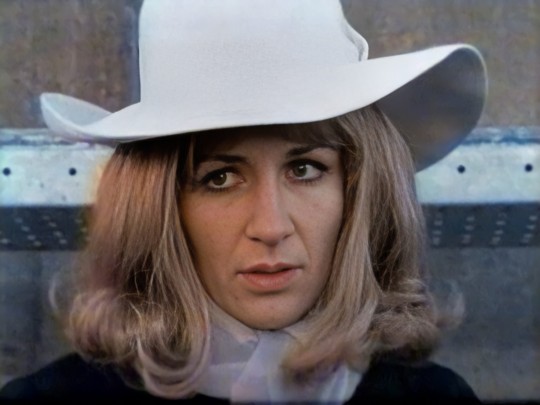
Celebrating Caroline John
Caroline Frances John (19 September 1940 - 5 June 2012) was an English actress who played companion Liz Shaw in Doctor Who during its seventh season. She revived the character for the BBV P.R.O.B.E. video series, as well as the Big Finish Companion Chronicles line of audios.
John was the third of eight children born to Vera (née Winckworth), an actress and singer, and Alexander John, a theatre director. She was educated at St. Joseph's convent school, Crackley Hall in Kenilworth.
After training at the Central School of Speech and Drama, she worked in theatre and toured with the Royal Shakespeare Company and the National Theatre Company. She appeared in Juno and the Paycock in a 1966 production directed by Laurence Olivier, King Lear, Rosencrantz and Guildenstern are Dead, The Merchant of Venice and as Hero in Franco Zeffirelli's production of Much Ado About Nothing.
John played the role of the Doctor's companion in 1970 opposite Jon Pertwee's Third Doctor. John was recommended to then Doctor Who producer Peter Bryant by another BBC producer, James Cellan Jones, who sent Bryant and his associate Derrick Sherwin photographs of her. Unlike most of the preceding and subsequent female companions of the Doctor, Shaw was a brilliant scientist and understood much of the Doctor's technobabble. Shaw and the Doctor discussed things on a more equitable level of intelligence, and the Doctor respected and rarely patronised her. New series producer Barry Letts believed the character was too intellectual to be a suitable companion to the Doctor and decided against renewing her contract for the next season.
During her final story, Inferno, John also played the part of Section Leader Elizabeth Shaw, an alter ego of her regular character that the Doctor encounters in an alternative time stream. John reprised the role of Shaw, albeit as a phantom, in the anniversary episode The Five Doctors, and also appeared in the special episode Dimensions in Time (1993), part of the BBC's annual Children in Need appeal. In the 1990s she appeared in a series of straight-to-video releases including The Stranger: Breach of the Peace, and as Liz Shaw in the P.R.O.B.E. stories written by Mark Gatiss. In these stories made by the production company BBV, a pipe-smoking Shaw works as an investigator (for the P.R.O.B.E. organisation).

John later appeared in two Big Finish Productions' audio dramas based on Doctor Who; Dust Breeding (2001), although playing a character other than Liz Shaw, and The Blue Tooth (2007) where, as Liz, she recounts in narrative form an adventure she once had with the Doctor and UNIT. After The Blue Tooth she played Liz in four more Companion Chronicle audio plays; Binary, The Sentinels of the New Dawn and Shadow of the Past. Her final audio play, The Last Post, which she recorded on 26 January 2012, was released after her death.
In addition to her role as Liz Shaw, Caroline John appeared as Laura Lyons in a 1982 televised version of The Hound of the Baskervilles, starring Tom Baker as Sherlock Holmes. She also appeared in episodes of Z-Cars, Casualty, The House of Elliot, and EastEnders.
John read most of the audiobook of Elisabeth Sladen's posthumously-released autobiography, with David Tennant, Brian Miller and Sadie Miller reading their contributions.
John was married to actor Geoffrey Beevers. The couple had three children: a daughter, Daisy, and sons Ben and Tom. She died on 5 June 2012 from cancer.
#Caroline John#Doctor Who#Jon Pertwee#Mark Gatiss#Bill Baggs#BBV#PROBE#Preternatural Research Bureau#Liz Shaw#UNIT#United Nations Intelligence Taskforce
21 notes
·
View notes
Text

peter_mero_official: Ezek a képek kedves és őszinte pillanatokat örökítenek meg. Centiről centire haladtunk a ruhapróbákon, közben Barbi mosolya is egyre szélesebb lett. Az ilyen fotók többet jelentenek, mint egy poszt; egy bizalmi kapcsolatot mutatnak be, amelyet nem csak az öltések kötöttek össze. @realbarbarapalvin hálás vagyok, hogy részese lehettem a boldogságodnak❣️
Köszönöm! ☺️🤗
@balazsmehesz@deermerobianka@capitano_giorgio
Barbara Palvin and Peter Mero Hivatalos via peter_mero_official on Instagram, 07/22/2023.
2 notes
·
View notes
Text
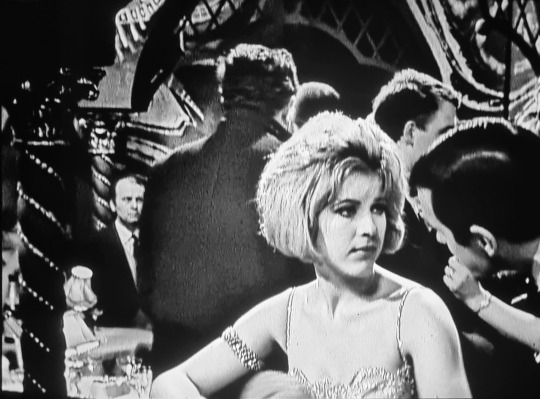

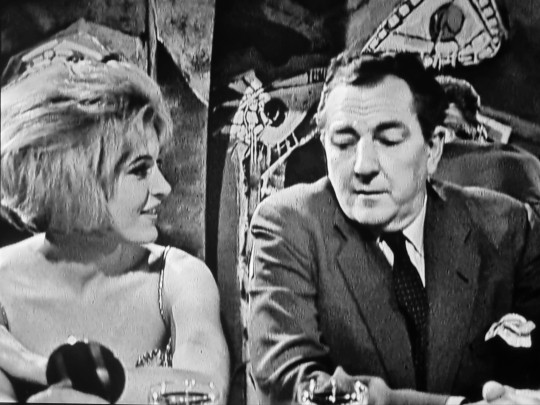
Artist, feminist, poet, personal hero - and occasional actor - Pauline Boty makes a characteristically brief appearance in Maigret: Peter the Lett (4.12, BBC, 1963) as Josie, a nightclub hostess
#fave spotting#pauline boty#bbc maigret#maigret#peter the lett#modern artists#pop art#Pauline acted off and on fairly regularly throughout her all too brief life and career‚ both on stage and screen#but on tv she was repeatedly ill served with small roles that required little more than looking pretty#alas a recurring element of her career; she battled sexism from the art college days through to her untimely death#and was frequently overshadowed by the men she considered friends and colleagues (and who did little to prevent her overshadowing)#there is a bitter irony to the fact that whilst her painting and collage work was challenging ideas about patriarchy and traditional gender#roles‚ the british press was presenting her as 'the beautiful actress who can also paint!'#I've admired Boty and her work for a long time now and I'm happy that she's undergoing a (slow) reappraisal but she's still#criminally under recognised considering the important position she has in the history of pop art and the 60s beat scene#her character here is‚ like so many she played‚ rather shallow and two dimensional (a comment on the script and not performance)#and it's notable that Maigret is uncharacteristically rude and dismissive in dealing with her#but then there's quite a lot going on in this episode and he has other things on his mind
18 notes
·
View notes
Photo

“Pár nappal később magammal vittem Hermant a Felfedezők Klubjába. Ott éppen Peter Freuchenbe, a sarkutazó klubtársamba botlottunk. Egyébként Freuchent lehetetlen észre nem venni, bármerre járjon. Hosszú, bozontos szakálla van, és akkora mint egy csűrkapu. Az ember azt hiszi, hogy talán éppen most érkezett ide a jégmezőkről és önkéntelenül is mögéje néz, hogy nem vezet-e maga mögött pórázon egy jegesmevét.”
”Illusztrációm Thor Heyerdahl : Tutajjal a Csendes-óceánon c. könyvének (1948) 2.fejezetéhez - “Felfedezők klubja”
Peter Freuchen (1886-1957) dán sarkkutató, író, újságíró egészen páratlan és kalandos életet élt. Először az általam is olvasott, Knud Rasmussen dán-eszkimó etnológus csapatában volt éllelmiszerellátásért felelős és az évszázad egyik leghíresebb sarki utazását tették meg amikor észak-Grönlandtól Alaszka legvégéig a mai Nome-ig mentek kutyaszánon közel 5000km-t. Ez önmagában is nehezen felülírható teljesítmény de Freuchen ennél sokkal tovább ment. Eszkimó felesége az akkor pusztító spanyolnátha áldozata lett. 1926-ban egy hóviharban eltévedt, egy hóbarlangban várta ki a vihar végét de lefagyott a lába és mire kórházba került amputálni kellett azt, ez véget vetett továbbio sarkutazó terveinek.Vásárolt egy kis szigetet, könyveket írt többek között az 1933-as Eskimo című film forgatókönyvét ami a következő évben elnyerte a legjopbb vágás Oscar-díját.A II. világháború alatt zsidókat fogadott be saját szigetére vagy menekített át Svédországba, angol ejtőernyősöket bújtatott a házában. Ezért a Gestapo letartóztatta de az ellenállás a barkkja falának szétrobbantásával kiszabadította.1943-ban ismét elfogták és halálra ��télték ám Freuchen ismét megszökött, Svédországba majd az Egyesült Államokba menekült. Itt feleségül vette Dagmar Cohnt a Vogue divatgrafikusát. Ekkor készült Irving Penn ikonikus fotója is Freuchenről amit ehhez a képhez használtam.1956-ban indult a “60000 dolláros kérdés” (The $60,000 Question) című kvízműsorban és megnyerte a főnyereményt. Egy évvel később hunyt el, regénybe illő életutat hagyva maga után. Grönland északi részén helyezték örök nyugalomra pontosan ott ahonnan annak idején Rasmussennel legendás utazásaik indultak.
5 notes
·
View notes
Text
<<Che cosa pensi della psicoterapia?>>.
Mi sembrava una gara per vedere chi faceva saltare prima i nervi a chi. Non mi pareva molto terapeutico, ma ce l'ho messa tutta per vincere. <<Penso che la psicoterapia sia un concetto fuorviante della società capitalistiche, in base al quale il crogiolarsi nell'analisi della propria vita sostituisce l'atto stesso di viverla>>. Non avevo idea da dove mi uscissero queste parole: le avevo lette, forse, o le avevo sentite in un film?
Un giorno questo dolore ti sarà utile - Peter Cameron
#un giorno questo dolore ti sarà utile#Peter Cameron#frasi pensieri#citazioni#libribelli#libri#libridaleggere#citazioni libri#frasi libri#libridaamare#frasi tumblr#citazioni tumblr#citazione tumblr#aforismi tumblr#tumblr italia#frasi per pensare#frasi per riflettere#citazione#frasi citazioni#frasi e citazioni#frasi tristi#frasi#frasi tristezza#piangere#ansia#sbaglio#tristezza#delusione#pensieri
3 notes
·
View notes
Text
„Ha én lennék a Mercedes csapatfőnöke, akkor Russellt második számúnak igazoltam volna le. Egy olyan szerződést dugtam volna az orra alá, amelyben világosan az áll, hogy nem végezhet Hamilton előtt” – tette hozzá.
Ha ez lett volna Wolff célja, akkor megtartja Bottast. De Hamilton öreg, most már egyértelműen az utódjának a castingja zajlik.
Mehet a szabad verseny, és ha bajnoki címért mérkőznek, az lesz a második számú, aki hátrébb van pontokban. Ha ez nem tetszik Hamiltonnak, és nyugdíjba akar menni, szerintem Wolff sem fogja visszatartani. 7 világbajnoki cím az így is nagyon szépen mutat, és itt most megint volt egy óriási technológiai váltás, ami hasonló esetben lényegében Schumachert is hátrébb lökte az addigi teljesítményéhez képest. Ez egy új világ, friss, fiatal pilóták kellenek. Most Hamilton helyzete erősen rímel Schumacherére, akkor Niko Rosberg volt az, aki most George Russel. Az időzítés sem véletlen, akkor a hibrid éra elején kellett beröffenteni a motorokat.
2 notes
·
View notes
Text
God knows the human heart…
Today’s reading of the Scriptures from the New Testament is the 15th chapter of the book of Acts:
Their peace was disturbed, however, when certain Judeans came with this teaching: “Unless you are circumcised according to Mosaic custom, you cannot be saved.” Paul and Barnabas argued against this teaching and debated with the Judeans vehemently, so the church selected several people—including Paul and Barnabas—to travel to Jerusalem to dialogue about this issue with the apostles and elders there. The church sent them on their way. They passed through Phoenicia and Samaria, stopping to report to the groups of believers there that outsiders were now being converted. This brought great joy to them all. Upon arrival in Jerusalem, the church, the apostles, and the elders welcomed them warmly; and they reported all they had seen God do. But there were some believers present who belonged to the sect of the Pharisees. They stood up and asserted,
Pharisees: No, this is not acceptable. These people must be circumcised, and we must require them to keep the whole Mosaic law.
The apostles and elders met privately to discuss how this issue should be resolved. There was a lot of debate, and finally Peter stood up.
Peter: My brothers, you all know that in the early days of our movement, God decided that I should be the one through whom the first outsiders would hear the good news and become believers. God knows the human heart, and He showed approval of their hearts by giving them the Holy Spirit just as He did for us. In cleansing their hearts by faith, God has made no distinction between them and us. So it makes no sense to me that some of you are testing God by burdening His disciples with a load that neither our forefathers nor we have been able to carry. No, we all believe that we will be liberated through the grace of the Lord Jesus—they also will be rescued in the same way.
There was silence among them while Barnabas and Paul reported all the miraculous signs and wonders God had done through them among outsiders. When they finished, James spoke.
James: My brothers, hear me. Simon Peter reminded us how God first included outsiders in His favor, taking people from among them for His name. This resonates with the words of the prophets:
“After this, I will return
and rebuild the house of David, which has fallen into ruins.
From its wreckage I will rebuild it;
So all the nations may seek the Eternal One—
including every person among the outsiders who has been called by My name.”
This is the word of the Lord, who has been revealing these things since ancient times.
So here is my counsel: we should not burden these outsiders who are turning to God. We should instead write a letter, instructing them to abstain from four things: first, things associated with idol worship; second, sexual immorality; third, food killed by strangling; and fourth, blood. My reason for these four exceptions is that in every city there are Jewish communities where, for generations, the laws of Moses have been proclaimed; and on every Sabbath, Moses is read in synagogues everywhere.
This seemed like a good idea to the apostles, the elders, and the entire church. They commissioned men from among them and sent them to Antioch with Paul and Barnabas. They sent two prominent men among the believers, Judas (also known as Barsabbas) and Silas, to deliver this letter:
The brotherhood, including the apostles and elders in Jerusalem, send greetings to the outsider believers in Antioch, Syria, and Cilicia. We have heard that certain people from among us—without authorization from us—have said things that, in turn, upset you and unsettle your minds. We have decided unanimously to choose and send two representatives, along with our beloved Barnabas and Paul who, as you know, have risked their lives for our Lord Jesus the Anointed. These representatives, Judas and Silas, will confirm verbally what you will read in this letter. It has seemed good to the Holy Spirit and to us to keep you free from all burdens except these four: abstain from anything sacrificed to idols, from blood, from food killed by strangling, and from sexual immorality. Avoid these things, and you will be just fine. Farewell.
So the men were sent to Antioch. When they arrived, they gathered the community together and read the letter. The community rejoiced at the resolution to the controversy. Judas and Silas, being prophets themselves, offered lengthy encouragements to strengthen the believers. After some time there, their mission was complete; so the leaders in Antioch released Judas and Silas to return to Jerusalem with a blessing of peace. [But after some thought, Silas decided to remain behind.] Paul and Barnabas stayed in Antioch, where they teamed with many others to teach and preach the message of the Lord.
Some days later, Paul proposed another journey to Barnabas.
Paul: Let’s return and visit the believers in each city where we preached the Lord’s message last time to see how they’re doing.
Barnabas agreed and wanted to bring John Mark along, but Paul felt that was a mistake since John Mark had abandoned them in Pamphylia and hadn’t finished the previous mission. Their difference of opinion was so heated that they decided not to work together anymore. Barnabas took John Mark and sailed to Cyprus, while Paul chose Silas as his companion. The believers in Antioch commissioned him for this work, entrusting him to the grace of the Lord. They traveled through Syria and Cilicia to strengthen the churches there.
The Book of Acts, Chapter 15 (The Voice)
A note from The Voice translation:
These debates give a glimpse of the cultural tensions present between Jewish and Gentile believers throughout the New Testament writings. The early Jewish believers still follow the traditional Jewish practices of Sabbath rest and kosher food. This is fine, until Jewish and Gentile Christians must share a table. How can they be truly unified as one church without being able to sit down together for a meal? This council affirms—under the influence of the Spirit’s work—that the outsiders may become Christians without becoming Jews first; but the outsiders should respect their Jewish brothers’ beliefs so they can fellowship together. The decision is a model for church unity: artificial hurdles should not be imposed for inclusion, but groups should willingly sacrifice their freedoms to promote unity in the church.
Today’s paired reading from the First Testament is the 48th chapter of the book of Genesis:
Soon after this, Joseph was brought word that his father was gravely ill; so he took his two sons, Manasseh and Ephraim, to see Jacob. When Jacob was told that his son Joseph had come to see him, he gathered his strength and sat up in bed.
Jacob (to Joseph): The All-Powerful God appeared to me at Luz in the land of Canaan many years ago and spoke His blessing over me, telling me, “I am going to make you fruitful and multiply your descendants so that you will give rise to nation after nation. I will give this land to them after you to have as their possession forever.” So Joseph, your two sons who were born to you in Egypt before I came here are mine. I claim Ephraim and Manasseh as my own, just as Reuben and Simeon are mine. As for any children you father after them, you may regard them as your own. When it comes time for your other children to gain their inheritances, they will be given land within the regions granted to their brothers, Ephraim and Manasseh. When I left Paddan, your mother Rachel died on our journey in the land of Canaan. We were not far from Ephrath, so I buried her there on the way to Ephrath (which is also known as Bethlehem).
Just then Israel noticed Joseph’s sons.
Jacob: And who are these?
Joseph: These are my sons, Father, whom God has given to me here in Egypt.
Jacob: Please bring them here to me, so I can lay my hands on them and bless them.
Israel’s eyes were dim because of his old age, so he couldn’t see well. Joseph brought the boys near to him, and Israel kissed them and hugged them warmly.
Jacob (to Joseph): I didn’t know if I would ever see your face again, but now God has given me more than I hoped: He has let me see your children too.
Then Joseph moved the boys aside—they had been at his father’s knees—and he bowed down low with his face to the ground. Then Joseph took his sons and brought them near to his father. He took his younger son Ephraim in his right hand and put him to the left hand of Israel, and he took Manasseh in his left hand and put him to the right hand of Israel. But Israel stretched out his hands and crossed his arms, laying his right hand on the head of Ephraim, the younger, and his left hand on the head of Manasseh, the firstborn. And he spoke this blessing over Joseph.
Jacob: May the God before whom my ancestors Abraham and Isaac walked,
the God who has been my shepherd all of my life and still to this day,
The messenger who has rescued me from all harm,
bless these boys.
And let my name be perpetuated through them,
as well as the name of my ancestors Abraham and Isaac,
And let them grow into a great multitude of people
throughout the world.
When Joseph saw that his father had laid his right hand on Ephraim’s head, he was troubled, and so he took his father’s hand to move it from Ephraim’s head to Manasseh’s.
Joseph: No, Father! Since this one is the firstborn, put your right hand on his head.
But Israel refused.
Jacob: I know, my son, I know. Manasseh will also become a people, and he will be great. Nevertheless, his younger brother will be greater than he, and his children will give rise to many nations.
So it was that Israel blessed Joseph and his sons that day.
Jacob: When the people of Israel speak blessings, they’ll remember you: “May God make you like Ephraim and Manasseh.”
So this is how Israel ranked Ephraim ahead of Manasseh.
Jacob (to Joseph): Look, I am about to die; but I know that God will be with you, and He will bring you back to the land of your ancestors someday. I am going to hand down to you more land than I give to your brothers. You will inherit a mountain ridge that I seized from the Amorites with my sword and my bow.
The Book of Genesis, Chapter 48 (The Voice)
A note from The Voice translation:
In the days of Abraham, Isaac, and Jacob, custom demands that the firstborn son become the next head of the family and inherit the name, status, and wealth of his father. But as we have seen throughout Genesis, God makes a habit of ignoring human customs, subverting tradition, and privileging the younger over the older. When it comes to the covenant, God typically chooses to pass its blessings and duties to the younger. The trend continues throughout Scripture as God selects David and then Solomon, both younger sons, as the two greatest kings over Israel. It is almost humorous the way Joseph tries to engineer the situation placing Manasseh, his firstborn, at his father’s right hand to receive the greater blessing. But Israel has none of it. He crosses his hands and extends the right hand to Ephraim, the second-born. Joseph is sure his ailing father has made a mistake. But Jacob knows exactly what he is doing.
A link to my personal reading of the Scriptures for friday, April 19 of 2024 with a paired chapter from each Testament (the First & the New) of the Bible along with Today’s Proverbs and Psalms
A post by John Parsons about looking up to “believe…”
The Limping Messiah...
As we prepare our hearts for the Passover, recall that the Hebrew verb "pasach" (פָּסַח) can mean not only "to pass over," but also "to limp," suggesting the heel of Messiah that was "bruised" in the battle for our salvation (Gen. 3:15). As it is written, "Just as Moses lifted up the serpent in the wilderness, so must the Son of Man be lifted up, that whoever believes in him may have eternal life. For God so loved the world, that he gave his only Son, that whoever believes in him should not perish but have eternal life (חַיֵּי עוֹלָם). For God did not send his Son into the world to condemn the world, but in order that the world might be saved through him" (John 3:14-17). Humanity as a whole has been "bitten by the snake" and needs to be delivered from its deadly venom. Just as the image made in the likeness of the destroying snake was lifted up for Israel's healing, so the One made in the likeness of sinful flesh was to be lifted up as the Healer of the world (Rom. 8:3). All we need to do is look up and believe...
Some people might object that the verb pasach (פָּסַח) alludes to the wounded Savior, our great Passover “Lamb who was slain” (John 1:29; 1 Pet. 1:19-20; Rev. 5:12; 13:8); however, it is evident that the Hebrew root can mean "to limp" as a result of a wound. Indeed the Hebrew participle pise'ach (פִּסֵחַ) means "lame" or "crippled" (for example, see Lev. 21:18; Deut. 15:21; 2 Sam. 9:13, etc.). Furthermore, there are several uses of the verb pasach that explicitly mean to “limp” or “be lame.” For example, in 2 Sam. 4:4 it says: "and he (Mephibosheth) fell and 'became lame" (וַיִּפָּסֵחַ); in 1 Kings 18:21, we read: "how long will you limp (פּסְחִים) between two opinions?" and in 1 Kings 18:26 it is written: "and they (the priests of Baal) 'limped upon the altar" (וַיְפַסְּחוּ עַל־הַמִּזְבֵּחַ) in a pagan ritual dance. In other words there is clearly a connection between Passover and becoming wounded, and this alludes to the Suffering Servant, the Messiah, whose heel was bruised in the battle for our deliverance (Gen. 3:15). Those who wish to argue that pasach cannot refer to the "limping" of the Messiah, the Passover “Lamb of God” who was slain for our sins in the battle against the serpent, therefore have the burden to explain the meaning and usage of the verb pasach in these other verses of the Hebrew Scriptures.
[ Hebrew for Christians ]
========
Gen. 3:15b reading:
https://hebrew4christians.com/Blessings/Blessing_Cards/gen3-15b-jjp.mp3
Hebrew page:
https://hebrew4christians.com/Blessings/Blessing_Cards/gen3-15b-lesson.pdf

4.18.24 • Facebook
from yesterday’s email by Israel365:
In a few days, Jews around the world will sit around the table as families and friends for the Passover seder. We will tell the story of the Exodus from Egypt, drink four cups of wine, eat matzah, and sing hymns of praise to God for His redemption of Israel, past and future alike.
During the long centuries of the Jewish exile, many customs were added to the Passover Seder by Jewish communities scattered across the globe. Many of these customs remain in practice only among those Jews who came from the lands where the customs began. Among the more peculiar customs is one that has been my favorite ever since I was a child. Many Ashkenazi Jews, those descended from European communities, will eat a hard-boiled egg just before the start of the main meal. The reason behind this custom is, at first glance, puzzling.
We find a discussion of this custom in the Code of Jewish Law known as the Shulchan Aruch, in a comment by Rabbi Moshe Isserles (16th century Poland), who remains today one of the most influential codifiers of Jewish law.
It is customary in some communities to eat an egg as a sign of mourning. It appears that the reason is that the night of the Ninth of Av is established on the same night as the Passover Seder. Furthermore, we recall the destruction of the Temple because that is where the Passover offering was brought. (Shulchan Aruch, O.C.476)
Today’s message (Days of Praise) from the Institute for Creation Research
April 19, 2024
Ministering Spirits
“Are they not all ministering spirits, sent forth to minister for them who shall be heirs of salvation?” (Hebrews 1:14)
Although most Christians are aware of the biblical doctrine of angels, few appreciate what a tremendous resource this may be. Even though they are invisible to us, angels are real and are more involved in our personal lives than we realize.
The primary purpose for which they were created by God was, according to our text, to be servants (i.e., “ministers”) to those who are to inherit salvation. They are beings of great wisdom, “to know all things that are in the earth” (2 Samuel 14:20). Furthermore, they “excel in strength” (Psalm 103:20). They can travel at tremendous speeds, “being caused to fly swiftly” (Daniel 9:21). Furthermore, there exists “an innumerable company of angels” (Hebrews 12:22), so God is able to dispatch any necessary number of them to “do his commandments” (Psalm 103:20) on behalf of His people.
Since their very existence is related to the heirs of salvation, they are intensely interested in all of God’s plans and in our own individual roles in those plans—“which things the angels desire to look into” (1 Peter 1:12). They serve as guardian angels (Psalm 34:7; 91:11), especially in relation to children (Matthew 18:10). They are present in each local church (Revelation 2:1; etc.), and while they minister to the church, they also themselves learn “by the church the manifold wisdom of God” (Ephesians 3:10). They are directly involved in the accomplishment of many providential miracles such as Daniel in the lion’s den (Daniel 6:22). Finally, they accompany each believer at death into the presence of the Lord (Luke 16:22; 2 Corinthians 5:8).
Perhaps, in that day, we’ll meet the particular angels who have been assigned to our own protection and guidance and can thank them properly. HMM
0 notes
Video
youtube
Maigret TV Series 2024👮 Peter the Lett 👮Full Episode 2024
0 notes
Text
Ahová a sors sodor
Peter Schmalz: Vérrel szemben
Paddington
A legjobb kémtörténeteket általában egykori kémek vagy éppen aktív hírszerzők írják. A Peter Schmalz írói álnév mögé rejtőző szerzőről nem sokat lehet tudni. Talán annyit, hogy orosz gyökerei is vannak, és a családjában nem ő az első, aki maga is a titkosszolga lett. Természetesen a szakmai érintettség nem elegendő ahhoz, hogy jó történet kerüljön az…

View On WordPress
0 notes